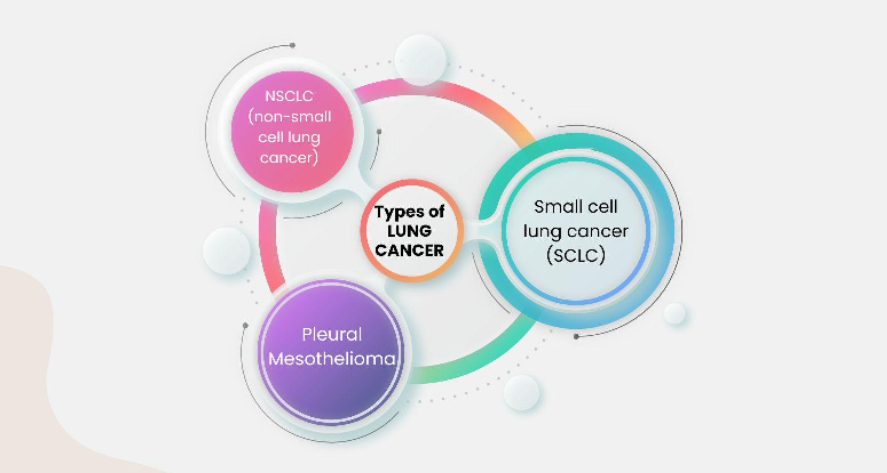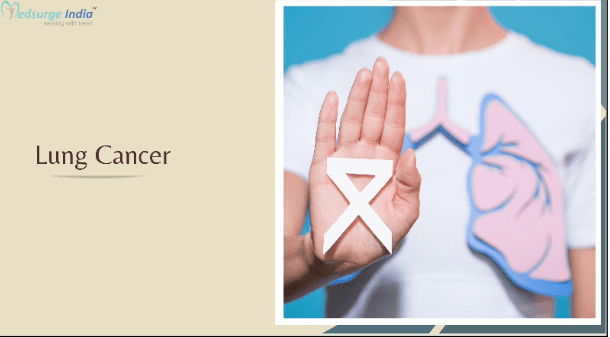The lungs are two spongy organs in your chest that take in oxygen and expel carbon dioxide as you breathe in. The largest cause of cancer-related fatalities globally is lung cancer. Lung cancer can affect persons who have never smoked, although smokers are at a higher risk than nonsmokers. The quantity and frequency of cigarettes you’ve smoked are related to your chance of developing lung cancer. Even after years of smoking, you can greatly lower your risk of developing lung cancer by quitting.
In this blog will learn more about what is lung cancer, its types how it is caused, its stages and what are its treatments.
What is Lung Cancer?
Lung cancer develops as a result of unregulated cell division in the lungs. Your cells naturally divide and create more copies of themselves. However, occasionally they experience modifications (mutations) that lead them to continue producing more of themselves when they shouldn’t. The uncontrolled division of damaged cells results in tissue tumors, which eventually prevent your organs from functioning correctly.
The term “lung cancer” refers to malignancies that begin in the lungs, typically in the alveoli or tiny air sacs (bronchi or bronchioles). Typically, cancers that originate elsewhere and spread to your lungs are given names according to those origins (your healthcare professional may refer to this as cancer that has metastasis spread to your lungs).
Causes of Lung Cancer
Lung cancer begins with cells that continue to divide despite the fact that they should not. While cell division is a natural process, every cell has an internal off switch that, when required, prevents cell division (senescence) or causes cell death (apoptosis). When a cell divides or undergoes too many changes (mutations), the off switch is activated.
Cancer cells are regular body cells that have undergone mutations and lost their ability to turn off. Uncontrolled cell growth interferes with your regular cells. Cancer cells have the ability to enter your lymph nodes or circulation and spread throughout your body. Although the exact reason why some individuals get cancer and others do not, some variables, such as smoking tobacco products, might increase your chance of lung cancer by harming your cells.
Note: For more info about liver cancer read about Lung cancer treatment cost in India.
Types of Lung Cancer
Although there are other malignancies that afflict the lungs, the terms “small cell lung cancer” and “non-small cell lung cancer” are the two most common.

NSCLC (non-small cell lung cancer)
The most prevalent form of lung cancer is non-small cell lung cancer (NSCLC). More than 80% of instances of lung cancer are caused by it. Squamous cell cancer and adenocarcinoma are common varieties. Two less frequent varieties of NSCLC include adenosquamous carcinoma and sarcomatoid carcinoma.
Small cell lung cancer (SCLC)
Compared to NSCLC, small cell lung cancer (SCLC) spreads more quickly and is more challenging to cure. A very tiny lung tumor that has already migrated to other regions of your body is how it is frequently discovered. Small cell carcinoma, also known as oat cell carcinoma, and mixed small cell carcinoma are two particular subtypes of SCLC.
Lung cancer of other forms
Other cancers, such as pleural mesothelioma (cancer in the lining of your lungs), lymphomas (cancer in your lymph nodes), sarcomas (cancer in your bones or soft tissue), and others, can begin in or near your lungs. These are not often referred to as lung cancer and are treated differently.
Stages of Lung Cancer
Cancer is often staged according to the initial tumor’s size, how deeply it penetrates the surrounding tissue, and if it has migrated to the lymph nodes or other organs. There are specific staging recommendations for each form of cancer.
Staging of lung cancer
There are a number of possible size and spread combinations at each level. For instance, a Stage III cancer may have a smaller main tumor than a Stage II cancer, but additional variables may have progressed cancer to a more serious stage. The overall lung cancer staging is as follows:
- Stage 0 (in-situ): The top layer of the lung or bronchus has cancer. It hasn’t spread to the exterior or to other lung tissue.
- Stage I: The cancer has not left the lung.
- Stage II: Cancer that is bigger than Stage I, has spread to internal lymph nodes or has many tumors in the same lung lobe.
- Stage III: Describes cancer that is more advanced than Stage II, has spread to neighboring lymph nodes or structures, or has several tumors in distinct lobes of the same lung.
- Stage IV: in stage 4 lung cancer the other lung, surrounding fluid, the heart, or other distant organs have all been affected by the cancer.
Treatment for Lung
It is essential to catch lung cancer in its earlier stages when treatments are more successful. Unfortunately, the initial lung cancer symptoms are often overlooked or misinterpreted. Common symptoms include a cough that persists for more than two weeks, chest pain, shortness of breath, and coughing up blood. Additionally, some individuals experience fatigue, loss of appetite, and weight loss.
If you have any of these symptoms, it is important to get checked out by a doctor. An X-ray, CT scan, or PET scan can help diagnose lung cancer. If cancer is found, a biopsy may be necessary to determine the type of cancer and its stage. Also, read the Cancer Treatment in India for further details.
Treatment options will depend on the type of lung cancer and its stage. Non-small cell lung cancer is the most common type of lung cancer. Treatments for this type of cancer may include surgery, chemotherapy, and radiation therapy. Small-cell lung cancer is less common, and in many cases, chemotherapy is the primary treatment.
- Surgery is a procedure when cancerous tissue is removed by physicians.
- Chemotherapy: The use of specialized drugs to treat or cure cancer. The medications may be taken orally, administered intravenously, or occasionally both.
- Radiation therapy: Using high-energy radiation with X-ray-like characteristics to treat cancer.
- Targeted therapy: the use of drugs to halt the growth and spread of cancer cells. The substances can be taken orally or intravenously.
- Before using targeted therapy, tests will be performed to see whether it is appropriate for the type of cancer you have.
- Radiation-frequency ablating: Radiofrequency ablation (RFA) is occasionally used to treat NSCLC tumors that are close to the borders of your lungs. RFA uses extremely powerful radio waves to heat and destroy cancer cells.
- Immunotherapy is a treatment that aids the body in battling cancer cells
- Palliative treatment, which provides symptom management assistance such as pain alleviation, oxygen therapy, and other services as needed
To treat lung cancer, many medical specialties typically work together. Medical doctors that specialize in lung diseases are referred to as pulmonologists. Surgeons are medical professionals who perform operations. Thoracic surgeons specialize in surgeries involving the chest, heart, and lungs. Medical doctors called oncologists utilize medication to treat cancer. Medical specialists known as radiation oncologists utilize radiation to treat cancer.
Bottom Line
It is important to note that not all lung cancer cases are the same. Everyone’s situation is unique, and their treatment plan should be tailored to their individual needs. If you or someone you love has been diagnosed with lung cancer, speak with your doctor about your diagnosis and available treatments. You can also find some of the best lung cancer hospitals in India that are known to provide the best care for patients all over the world.
No matter the diagnosis, it’s important to stay hopeful and remember that there are treatments available for lung cancer. With the advances in medical technology, more and more individuals are surviving and even thriving after a lung cancer diagnosis. Furthermore, the lung cancer survival rate in India is on par with other well-known nations around the globe. If you have any questions or concerns, speak with your doctor about your diagnosis, available treatments, and support options. Visit Medsurge India so it can also assist you in locating the best oncologist in India.



































